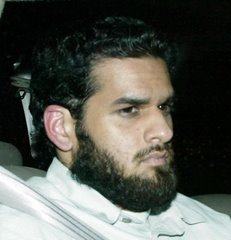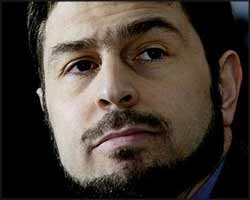 From VOA News: "Canadian Rendition Victim Testifies On Extraordinary Rendition": in full, for the record, with my emphasis:
From VOA News: "Canadian Rendition Victim Testifies On Extraordinary Rendition": in full, for the record, with my emphasis:By Dan Robinson | Capitol Hill | October 18, 2007We've entered a realm in which I am almost speechless, but I do have one comment:
A Canadian citizen detained by U.S. authorities in 2002 on suspicion of having links to al-Qaida, and sent to Syria where he was tortured, has testified for the first time before a congressional committee. VOA's Dan Robinson reports, Maher Arar addressed a panel examining extraordinary rendition, in which U.S. authorities have sent terrorist suspects to other countries for interrogation.
A Syrian-born Canadian citizen, Arar was detained in September 2002 at New York's Kennedy Airport, on suspicion of having links to al-Qaida, which was responsible for the September 11, 2001 terrorist attacks on the United States.
The information came from a Canadian police report describing him as well as his wife as Islamic extremists with suspected terrorist links.
Against his protests and after interrogations by U.S. officials, he was deported to Syria via Jordan, where he says he suffered severe torture for 10 months at the hands of Syria's Military Intelligence, before his release in October 2003.
Arar was never formally accused of any crime in the United States or Canada. A 2.5-year Canadian investigation cleared him of any links with terrorist organizations or activities, and ordered that he be paid more than $10 million in compensation.
Testifying by video link from Canada, because he remains barred from the United States [see photo], Arar condemned what he calls the immoral practice of rendition.
"Let me be clear, I am not a terrorist, I am not a member of al-Qaida or any other terrorist group," said Maher Arar. "I am a father, a husband, and an engineer. I am also a victim of the immoral practice of rendition."
U.S. lawmakers offered Arar apologies and regrets, and voiced disappointment that the U.S. government has not done the same.
Democratic Congressman William Delahunt, chairs a House Judiciary subcommittee on human rights issues:
"Mr. Arar, let me personally give you what our government has not, an apology," said Congressman Delahunt. "Let me apologize to you and the Canadian people for our government's role in this mistake."
While they also offered apologies, Republicans Trent Franks and Dana Rohrabacher nevertheless defended the U.S. rendition program as an effective anti-terrorism tool:
FRANKS: "I sincerely believe that the story of Mr. Arar will ultimately not be shown to be a failure of U.S. rendition policy, but instead an anomalous failure in the particular circumstances caused by false intelligence and information from Canada."
ROHRABACHER: "An error in a program does not mean that program in and of itself is a wrong program."
In dramatic testimony, Arar described torture he was subjected to in a Syrian prison, treatment he says left him with permanent emotional scars.
"I was beaten with an electrical cable and threatened with a metal chair, [a] tire and electric shocks," testified Arar. "I was forced to falsely confess that I had been to Afghanistan. When I was not being beaten I was put in a waiting room so I could hear the screams of other prisoners. The cries of the women still haunt me the most."
Arar's principal counsel Kent Roach, of the University of Toronto, reviewed key conclusions of the Canadian investigation headed by the Associate Chief Justice of Ontario, Dennis O'Connor.
"He recognized the importance of information sharing between Canada and the United States, but stressed that that information must be accurate, precise and reliable," said Kent Roach. "He identified the danger of guilt by association in national security investigations, and identified the impossible position that a person is put in when they have to defend themselves against secret information that they do not know."
Although no Bush administration officials appeared at the hearing, the administration position has been that it complies with U.S. legal obligations because foreign governments provide diplomatic assurances they do not use torture.
Congressman John Conyers, a Democrat calls this unreliable at best, and asserts that rendition violates international and U.S. law.
"It seems to me that as a nation we must not evade these important legal prohibitions by rendering suspects to countries for torture," said Congressman Conyers.
Expert legal witnesses agreed that diplomatic assurances from countries with a record of torture are unreliable.
Daniel Benjamin, of The Brookings Institution in Washington, D.C. says rendition harms U.S. credibility.
"The issues of rendition and torture have become intertwined in the public imagination in our nation and in the minds of our friends abroad," said Daniel Benjamin. "Abuses that have been committed in the name of the Global War on Terror trouble the conscience of those who care about America's reputation and those who have been proud of our nation's role as a champion of the rule of law."
Frederick Hitz of the Center for National Security Law at the University of Virginia, says rendition should be illegal.
"I view it much as I do the executive order prohibition on political assassination," he said. "We should not be in the business of coercive torturous interrogations, directly or indirectly."
Another witness, David Cole of Georgetown University's Law Center suggested that Congress should call for an independent investigation of the Bush administration's rendition policy.
If John Conyers really believes that "as a nation we must not evade these important legal prohibitions by rendering suspects to countries for torture," then it's about time he did something about it.
Here's more, from the Toronto Star:
 U.S. leaders apologize to Arar
U.S. leaders apologize to Arar`This was a kidnapping,' U.S. congressman says of Canadian's arrest and deportation to SyriaPaul Koring of Toronto's Globe and Mail has more on the exchange between Rohrbacher and Arar:
by Tim Harper | WASHINGTON BUREAU | October 19, 2007
WASHINGTON -- Republicans joined with Democrats yesterday to offer Maher Arar something he has never received from the Bush administration – an apology for the U.S. role in wrongly detaining him, then sending him to Syria where he was tortured.
More than five years after his nightmare began, Arar received the apologies from congressmen as far apart on the ideological spectrum as possible in Washington, even if they differed widely on the value and legality of the Bush administration's practice of "extraordinary rendition" of terror suspects.
The 37-year-old wireless technology consultant listened by video link from Canada as an American legislator provided the most damning, blanket condemnation of the government's so-called security dossier, which it maintains contains evidence that Arar still poses a threat to the U.S.
"There is nothing there," said New York Democrat Jerrold Nadler.
"There is nothing there to justify the continuation of this campaign of vilification against you or to deny you entry into this country."
Arar testified before a joint committee of the House of Representatives from Ottawa because he remains on the no-fly list and is barred from the U.S.
The administration even denied him entry to tell his story in person, said a clearly agitated Nadler.
He said he could not recall having to go to such lengths to get a witness to appear before a committee, and said he looked forward to personally apologizing to Arar on American soil.
Nadler said he was allowed to see the government dossier Wednesday.
"This was a kidnapping," he said.
His assessment, while more blunt, mirrored that of the co-chairs of the Senate judiciary committee, Democrat Patrick Leahy of Vermont and Republican Arlen Specter of Pennsylvania, as well as Canada's Public Safety Minister Stockwell Day, all of whom have been allowed to view the top-secret dossier.
Arar calmly related the tale of his imprisonment and torture in Syria, firmly answering questions from the legislators and decrying the continuing "smear" against him by U.S. President George W. Bush and his administration.
Nadler and Bill Delahunt of Massachusetts, two Democrats who chair subcommittees of the judiciary committee, called the hearing yesterday in a bid to highlight the Arar case and put an end to the Bush practice of rendition, in which terror suspects are plucked from the streets and sent to other countries where they are tortured.
In Arar's case, U.S. authorities, acting on flawed Canadian intelligence, detained him at New York's JFK Airport in September 2002, then flew him to Syria via Jordan without Ottawa's knowledge.
"Let me personally give you what our government has not – an apology," Delahunt said to Arar.
"Let me apologize to you and the Canadian people for our government's role in a mistake."
He said most Americans and most members of Congress agree with that sentiment.
Even Republicans on the committee who pointed to Canadian culpability in the case and defended harsh interrogation techniques joined with Delahunt.
The surprise was the reaction of California Republican Dana Rohrabacher, a conservative who defended the rendition program, but also offered heartfelt apologies to Arar and said that he should be compensated.
"I join in offering an apology and I wish our government could join me in doing this officially," he said.
"When we make a mistake, we should own up to it."
He said the fact that the administration blocked Arar's personal appearance was evidence of "an arrogance that I don't like to see in our government.
"It only adds insult to injury," he said. "You should be let off the list, compensated and allowed to come here and tell your story."
But the Bush administration has not backed down from its story that Arar was deported, and it has not explained why he was sent to Syria when he asked to be allowed to return to Canada where his family and livelihood awaited.
Besides continuing to bar Arar from the country, the administration is working to block his lawsuit in a New York court.
The appeal will be heard next month.
Arar's telling of his tale gripped the committee room, which was packed with spectators even if the hearing was sparsely attended by legislators.
He did not mince words in his condemnation of the U.S., saying his "abuse" continues because of his status on the no-fly list and his continued court ordeal.
"This has the effect of a smear campaign on my already damaged reputation," he said.
"Normally, these types of actions are attributed to the governments of dictatorships."
Arar's case, meticulously documented in Canada before the inquiry headed by Justice Dennis O'Connor, is almost as well-known here, where he is considered the most aggrieved victim of a practice that has been carried out at least 50 times, perhaps more than 100 times, by the administration.
Delahunt praised Canada for being accountable for its culpability in the case, and said it "cries out" for a similar independent probe in this country.
Arar was ultimately awarded $10.5 million in compensation plus legal fees by the Stephen Harper government.
Delahunt, in an interview following the hearing, said he had not seen the dossier on Arar, but he accepted Day's conclusion that there was nothing in it to prevent Arar from entering the U.S.
"Mr. Arar is always welcome in the U.S.," he said.
"We've seen enough dossiers from this administration – dossiers on weapons of mass destruction and the link between Saddam Hussein and 9/11."
Several U.S. congressmen apologize to Arar : Democrats decry practice of sending terrorism suspects to countries where they face strong possibility of torture
... Mr. Rohrabacher pointedly noted that it was Canadian police who first fingered Mr. Arar and then warned U.S. counterterrorism agents that he would be roaming free if he were allowed to return to Canada.Al Jazeera ran a photo of Maher Arar with his children.
"The Canadian government had told our FBI that Mr. Arar was under investigation for possible terrorist activities and ties to al-Qaeda. ... At the time, one year after the worst foreign attack on American soil in the history of our country, our government had in its custody a man whom we were told was a probable terrorist with al-Qaeda connections. To complicate the situation, the Canadian government informed our FBI that they did not have enough evidence to charge Mr. Arar; thus he would most likely go free if returned to Canada."
Mr. Rohrabacher called it a terrible mistake. But he defended both the practice of extraordinary rendition - the forcible removal of suspects to third countries - and extreme interrogation methods.
At one point, he asked Mr. Arar whether he would approve of water boarding, in which the person being interrogated believes he is being drowned, if it would prevent a terrorist attack that could kill his children.
Mr. Arar, who was tortured in Syria where he told interrogators that he had been in Afghanistan, said information extracted under duress is unreliable.
 Apology call for 'rendered' victim
Apology call for 'rendered' victim... Describing his ordeal to the House of Representatives Judiciary and Foreign Affairs committees via video link, Arar said he still suffers from nightmares, feels emotionally distant from his wife and children and has had trouble working.
...
"I am not the same person I was. I have come to accept this as part of my new life, but I want to make sure no one else goes through what I went through," he said.
Arar told the committees he was beaten with electric cables, kept in a cell measuring 1.8m by 0.9m [3 by 6 feet] and did not see sunlight for six months.
...
"The most fundamental question that has not been answered yet is: why did the US government decide to send me to Syria and not to Canada?" he said.
The US government has sought to dismiss Arar's case on the grounds that it would violate state secrets.
It acknowledges conducting "renditions" or secret international transfers of terrorist suspects, often to countries with dubious human-rights records, saying the programme has prevented further attacks.


